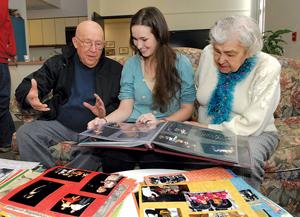By Emily Gold Boutilier
 Young, center, looks over a scrapbook with local seniors Clarence Poirrier and Elaine Fligman. Young and some fellow Amherst students assembled the scrapbook for the Amherst Senior Center. |
As director of the Town of Amherst’s Senior Center, Nancy Pagano works with hundreds of volunteers. But she’s never met anyone like Bessie Young ’11. “We’re not sure what we’re going to do without her,” Pagano says. “We feel like we’re related to her. She’s what any of us would like in a daughter. She’s extraordinary.”
A volunteer at the center since her first year at Amherst, Young has stepped up to do whatever needs to be done, whether it’s visiting elderly residents, planning intergenerational “Singing Suppers” or recruiting fellow students to move furniture.
Aging is also her academic focus. For Young’s interdisciplinary senior thesis, she traveled, camera in hand, to nursing homes in the United States, Turkey, France and Italy to document how the settings in which people age affect their quality of life. Now, Young will pursue her interests in photography and cross-cultural gerontology in a place where the needs of senior citizens are perhaps unprecedented: post-tsunami Japan.
Young is one of 17 people nationwide to win a 2011 Henry Luce Foundation scholarship to live and work in Asia. Based near Kyoto—some 400 miles southwest of the area hardest hit by the March earthquake, tsunami and nuclear radiation leak—she’ll work in a nursing home or senior center.
Japan has a higher proportion of elderly citizens than any other country. These citizens were disproportionately affected by the March 11, 2011, tsunami. For example, The New York Times reported on March 15, 2011, in an article about the Japanese hamlet of Yuriage, that most tsunami victims in that hamlet were people too old to have outrun the wave. According to the news report, “in a panic to reach the roof” of the tallest building, younger residents climbed over and pushed aside older people too weak to climb the stairs. As Young immerses herself in the Japanese culture and language, she also expects to study such issues as “the hierarchy of who gets to be saved” in disasters. “I have no idea how [the tsunami] is going to affect my year,” she says, “but I guarantee I’ll be examining it.”
 One of the photos Young took for her thesis about how the settings in which people age affect their quality of life. |
Young’s interest in aging began freshman year, when she took Professor Lisa Raskin’s course “Psychology of Aging.” As part of the course, the Senior Center matched her with an elderly resident named Mae Deuwson, whom Young befriended and continued to visit until the woman’s death. Young went on to serve as Raskin’s teaching assistant.
Raskin and Associate Professor of Art Justin Kimball are Young’s thesis advisers. The thesis, a book of photos with accompanying text, explores the architecture of senior living facilities, their psychological impact on residents and what they reveal about their societies’ attitudes toward the elderly. “I’m looking for evidence of life,” Young says of her photos: they include details such as words on a white board, glasses on a table, slippers under the bed. “I’m looking to capture the feeling of the place.”
Read about Young's Luce Scholarship and view some of her recent work here.
Photos by Gordon Daniels/Amherst Bulletin and Bessie Young '11